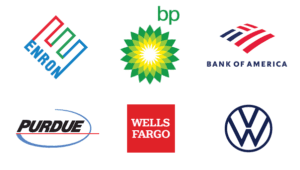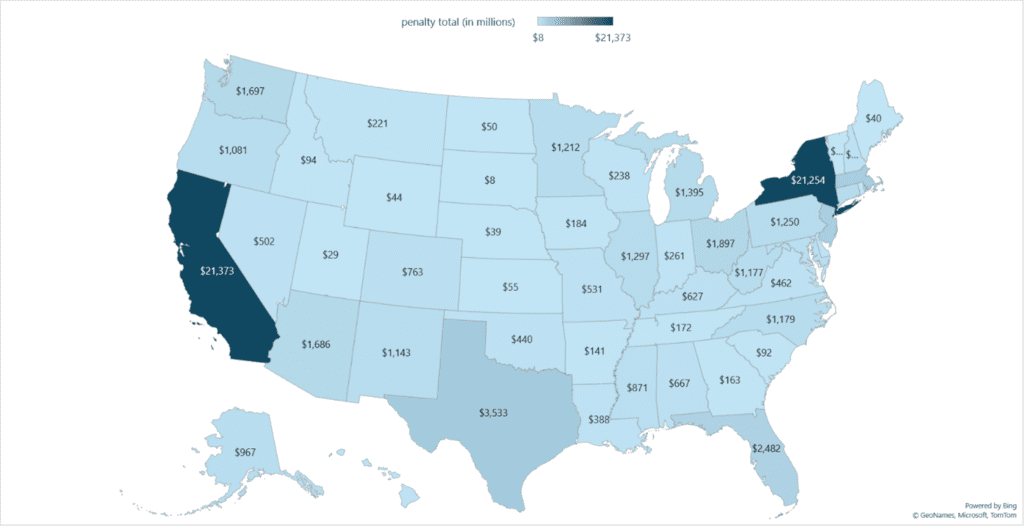
Corporations in the United States have now paid more than $1 trillion since 2000 in regulatory fines, criminal penalties, and class-action settlements. This staggering total comes from a just-released report by Good Jobs First.
What stands out is the exponential growth of the fines, as detailed in Violation Tracker, a wide-ranging database containing information on more than 600,000 cases from 500 federal, state, and local regulatory agencies and prosecutors. In the early 2000s, total annual payouts for corporate misconduct were around $7 billion; in recent years, that’s grown to over $50 billion—a 300% increase in constant dollars.
Despite making up only 20% of the database’s penalty total – roughly $215 billion – the annual total of penalties levied by state and local agencies also exploded: from around $2.5 billion in the early 2000s to $8 billion last year.
States not only play a role in enforcing state-level regulations but are also responsible for the application of some federal laws, such as the Clean Air Act and the Clean Water Act. Nearly two-thirds of the state totals came as the result of cases in which state attorneys general brought a group action, usually against a large company poorly operating across the country.
Financial and consumer protection offenses account for the largest portions of multi-state penalties. The largest such case to date was a 2008 settlement with the Swiss bank UBS, which agreed to pay $11 billion to resolve allegations that it misled investors in the marketing and sale of auction rate securities. That same year, Countrywide Home Loans paid nearly $9 billion to resolve allegations of predatory home mortgage practices.
Multi-state litigation is also common in enforcing healthcare violations. This played a particularly important role in exposing the actions of pharmaceutical manufacturers and distributors in exacerbating the opioid crisis.
Excluding multi-state cases, state regulation focused primarily on financial, consumer protection, and environmental offenses. Financial cases accounted for nearly $23 billion in penalties—soaring above every other category. Consumer protection and environmental violations follow at $15 billion and $13 billion, respectively.
Variations in state legislation, size, population, or funding can cause wide discrepancies in the penalty totals of the states. Those totals range from over $21 billion in California and New York, to less than $9 million in South Dakota.

California and New York together account for more than half of all state penalties apart from the multi-state cases. Sixteen other states have totals between $1 billion and $3.5 billion.
When state penalties are broken down into our nine offense groups, California and New York are at the top in every category except for healthcare-related offenses. The leader in that area is Florida, which has handed out nearly $2 billion in healthcare penalties since 2000, mostly related to nursing home violations involving resident health and safety. Washington State—renowned for its medical care—comes in second with more than $830 million in penalties.
Some of the disparities among state penalty totals is likely due to inadequate disclosure practices rather than an actual lack of enforcement. Numerous states need to improve agency transparency so that the public can see how much enforcement they are actually doing.
While state governments generally do a good job in targeting larger companies in their multi-state actions, some states have limited participation in these cases. More vigorous enforcement is needed at the local level in most states to duplicate the achievements of county and city agencies in California and New York. Taking what appears to be a half-hearted approach to enforcement deprives residents of the protections contained both in state regulations and in the federal laws the states help to enforce.
That companies have paid $1 trillion in fines, fees, and penalties for their actions is bad enough. But the totals would be much higher – for federal, state, and local agencies – if so many of these corporate leaders weren’t simply given a slap on the wrist when caught engaging in harmful or deceitful practices.